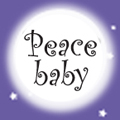Our Newsletter
Brands
Our Products
FAQ
What is music therapy?
Music therapy is the use of sound to incite a particular change in mood or behavior. In Peace Baby®’s case, music is used to help create a peaceful, stress-free and nurturing environment for mothers and babies.
What benefits does music therapy offer babies?
Music therapy can help create a familiar and secure environment for babies. Research suggests music can be particularly soothing if played during the last trimester of pregnancy, as it helps create a familiar environment for the child once it is born (Note#1). In the United States, music therapy is used by some hospitals as a stress reduction technique for premature infants. Music therapy has been credited for helping stabilise premature babies’ heart rate and oxygen intake, which in turn helps the baby grow. Both Peace Baby® CDs feature the soothing, rhythmic sound of a resting heartbeat and special sounds a baby is likely to hear inside the womb as well as once it is born.
Has research been undertaken to support these benefits?
Yes, the research findings mentioned in question 2 were presented at the 7th International Music Medicine Symposium held on Monday 5 October 1998 at the Melbourne University Faculty of Music.
What benefits does music therapy offer mothers?
It is widely agreed among paediatricians, naturopaths and mothers alike that ‘relaxation time’ is essential for expectant mums, particularly towards the end of the pregnancy and immediately post birth, a period which for some women – especially first time mums – can be a highly stressful time. Feedback in relation to Peace Baby® indicates that women feel emotions such as stress and anxiety can be passed on to a baby both in the womb and after birth. As such, a dedicated relaxation CD such as Peace Baby® is important from both a health and lifestyle perspective.
How was Peace Baby® produced and why?
Research suggests that babies respond best to simple sounds and lullabies rather than complex, classical arrangements that can overload their senses (Note#2). As such, Peace Baby® was produced using a blend of traditional organic instruments, including the acoustic guitar and human voice, combined with today’s most advanced electronic instruments. The result is a collection of warm, ethereal tracks that resonate with both mother and child.
Have the effects of Peace Baby® been researched? What were the results?
Yes, in January 2003 Peace Baby® commissioned DDB Strategic Research to undertake a study to gauge the effects of Peace Baby®. The sample group, which included a diverse cross section of mums in the third trimester of their pregnancy, provided extremely encouraging feedback. Specifically, Peace Baby® was found to:
- “Create a calm and soothing environment,” when played as background music;
- “Help clear your head of everyday things,” and “allow your mind to wander,” when played at the end of a long day or on the way home from work;
- “Be an excellent gift that would help you recognise the baby is already a person” and “provide encouragement for getting to know your baby,” when played pre-birth;
- “Provide a comfortable and familiar surrounding that may help you establish a sleeping routine,” once baby is born and
- Help the mother calm down: “It can be pretty stressful having a new baby so perhaps you could use Peace Baby to get yourself calmed down!”
- Over 95 per cent of mums said they would continue to play Peace Baby® in their child’s nursery post-birth, as they felt it would be an excellent soother for an unsettled baby or a baby trying to go to sleep.
How is Peace Baby® different to other products on the market?
Unlike similar CDs on the market, Peace Baby® has been customised to the specific needs of mothers and babies during the pre-and post-birth stages. While the music seems to have an unstructured and carefree nature, it has been carefully crafted to appeal to a very specific target audience. Whereas competing products feature more complex classical arrangements, Peace Baby® prefers gentle lullabies and angelic tones which research suggests babies prefer.
Can I buy Peace Baby® Volume 1 & Volume 2 separately or only as a double pack?
Yes, you can buy each CD - Pre-birth and Post-birth - separately, however they’re also available together in the double pack.
Does Peace Baby® make a suitable gift?
Yes, feedback received from expectant and new mothers whole-heartedly endorses Peace Baby® as a thoughtful and unique gift idea. For the ‘mum-to-be,’ Peace Baby® can help create a bond between the unborn baby and mother during the long nine-month wait. For new mums, Peace Baby® is a useful, lasting gift that will help create a peaceful environment when baby is finding it hard to settle or sleep.
How do I unsubscribe from the Peace Baby® newsletter?
Please use our easy unsubscribe form.
Note 1: Dr Jane Standley (Professor of Music Therapy at Florida University), VIIth International Music Symposium, Monday 5 October 1998, Melbourne University Faculty of Music.
Note 2: Dr Fred Schwartz (Anaesthetist at Piedmont Hospital Georgia), VIIth International Music Symposium, Monday 5 October 1998, Melbourne University Faculty of Music.
